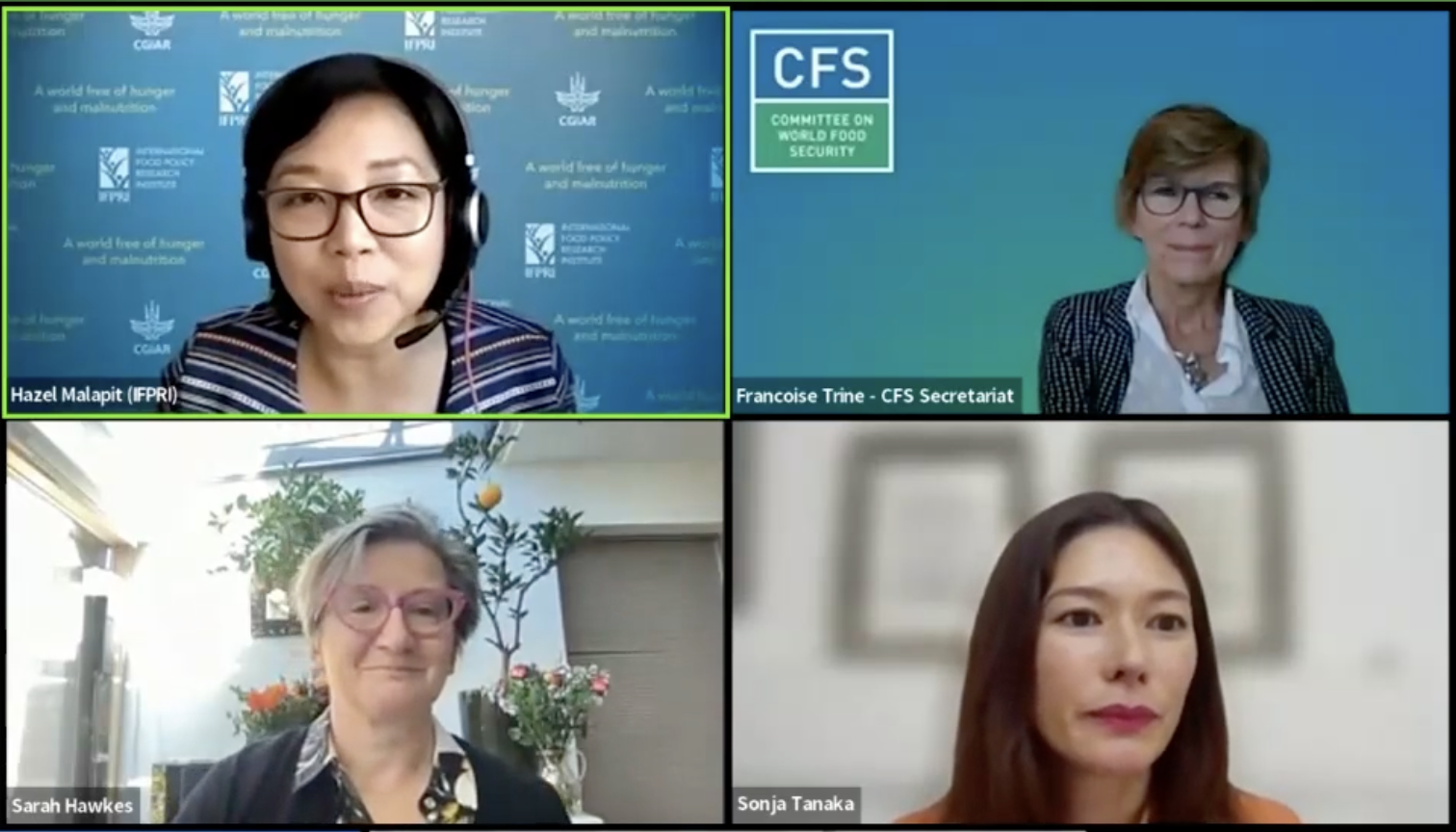Around the world, women play a key role in every part of the food system, but their contributions are often undervalued, underpaid, and overlooked. Women and girls also face a disproportionate burden from shocks, such as those driven by the COVID-19 pandemic and the current food and cost-of-living crisis. Women and girls are more likely to face food insecurity and malnutrition—in 2021, at least 126 million more women than men experienced food insecurity, a gap that continues to grow.
Global food system organizations are critical to advancing gender equality and building women’s empowerment. But how do their own workplace practices measure up? The Global Food 50/50 initiative, a collaboration between Global Health 50/50, IFPRI, and UN Women, assesses how well these organizations perform on gender equality, with the goal of building more effective organizations—and ultimately more equitable and sustainable food systems. Hungry for Gender Equality, the initiative’s second annual report, reviews the gender and equity policies and practices of 51 major organizations, complementing the leadership analysis with a focus on the board members of governing bodies.
The launch event, held October 18 as part of the World Food Prize 2022 Borlaug Dialogue virtual side-events, presented major findings from the report and explored potential for future progress. In his opening remarks, Johan Swinnen, CGIAR’s Managing Director for Systems Transformation and IFPRI’s Director General, emphasized the risks facing women: “On the brink of COP27, as the global community comes together to design, implement, and monitor crisis responses, these solutions must provide resources to help women and girls cope with crisis in the short term and challenge the systems that perpetuate inequality.”
Sarah Hendriks, Director of the Policy, Programme, and Intergovernmental Division at UN Women, underscored how food systems embed multiple and intersecting forms of discrimination against women and girls. “Now is the time for collective, decisive action and accountability,” she said.
In his keynote address, Ambassador Gabriel Ferrero, Chair of the Committee on World Food Security (CFS), discussed the importance of the Global Food 50/50 report to the CFS Voluntary Guidelines on Gender Equality and Women’s and Girls’ Empowerment in the Context of Food Security and Nutrition, which are currently being negotiated by member states.
“Global Food 50/50 is not just a report—it is both an accountability and a change mechanism,” said Jemimah Njuki, Chief of Economic Empowerment at UN Women. Sonja Tanaka, Deputy Director of Global Health 50/50, presented in-depth findings from this year’s report. Although public commitment to gender equality remains high, nearly half of organizations in the report’s sample lack transparent plans for diversity and inclusion, and half have more men than women in leadership bodies. Most board seats are occupied by nationals from high-income countries, and 70% of CEOs and board chairs are men. Of the 351 board seats assessed in the report, only 2% are held by women from low-income countries.
In the panel discussion moderated by Hazel Malapit, Senior Research Coordinator at IFPRI, representatives from civil society organizations, development partners, and policymakers highlighted the critical importance of gender equality, both to food systems as a whole and to organizations and their programming.
Within the informal sector, women working in the food supply chain face unique risks related to climate change and markets. Megha Desai, Senior Coordinator for the Self Employed Women’s Association (SEWA) in India, noted that the sector’s contribution to food systems is “invisible but vital,” and called for action and research targeting women’s needs.
Martha Nyagaya, the Country Director for Kenya at Nutrition International (NI), emphasized the interconnections between food security, nutrition, and gender. “At NI, we try to achieve an equitable, inclusive organization that confronts and addresses gender equity by promoting diversity in our governance structures in leadership and decision-making, but, most importantly, in our programs,” she explained.
From the UN Food and Agriculture Organization (FAO), Benjamin Davis, Director of FAO’s Inclusive Rural Transformation and Gender Equality Division, discussed recent progress in achieving workplace gender equality, as well as future goals. He commended the GF5050 initiative, saying “the report is a much-needed resource for the global response to gender inequality at the highest institutional level. The fight is not over, and it needs to happen at all levels, from the boardroom to communities to within families.”
Maura Barry, the Senior Deputy Assistant to the Administrator for USAID’s Bureau for Resilience and Food Security, highlighted recent White House and USAID initiatives to advance diversity, equity, inclusion, and accessibility. “We know that gender equality and women’s empowerment can help eradicate poverty, build vibrant economies, and unlock potential on a transformational scale,” she said, further noting that “if women are not involved in developing and implementing solutions, our work will not be as impactful and sustainable as it could be”.
In closing remarks, Sarah Hawkes, Co-Founder and Co-Director of Global Health 50/50, reflected on the many crises facing the world’s women. She emphasized that “words on paper” mean nothing without implementation, saying “Accountability mechanisms like this report make sure that those great words on paper are actually measured and monitored.”
Claire Davis is a Senior Editor with IFPRI’s Communications and Public Affairs Division.







